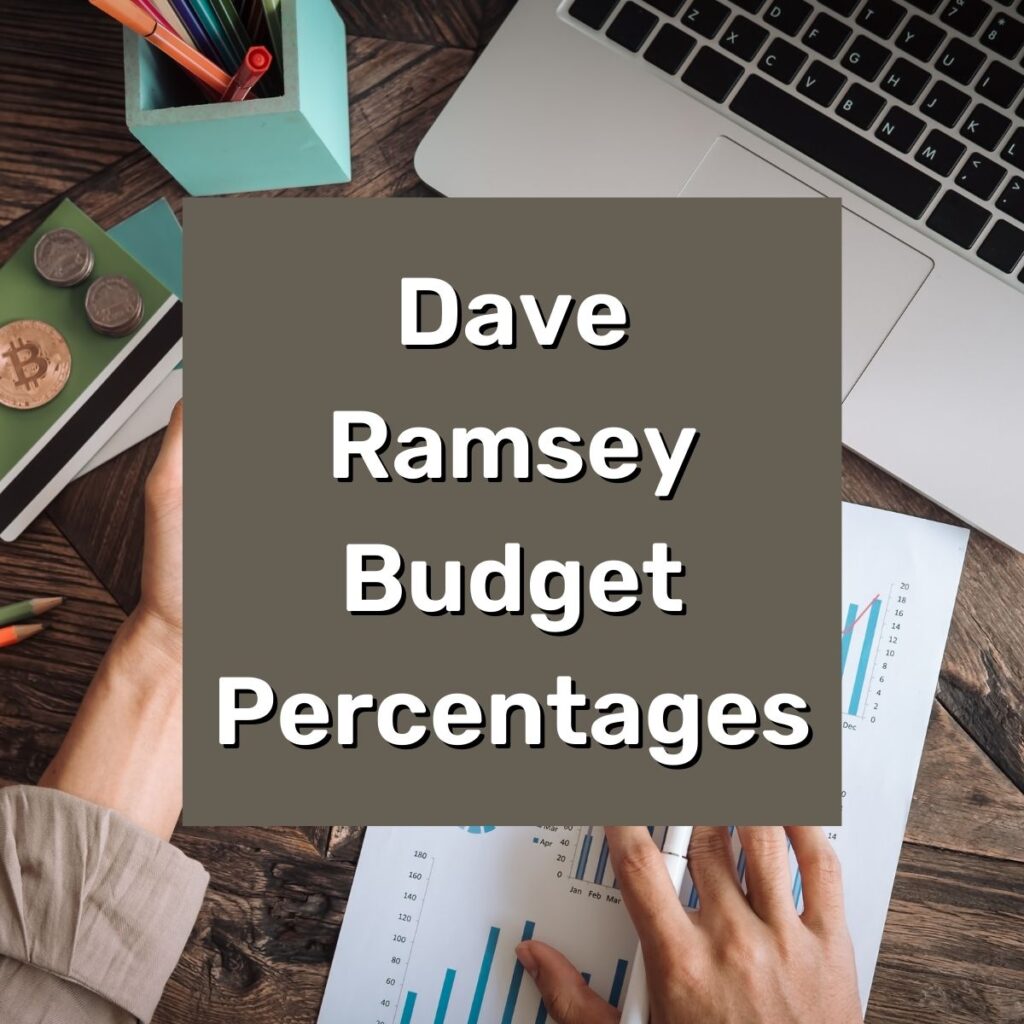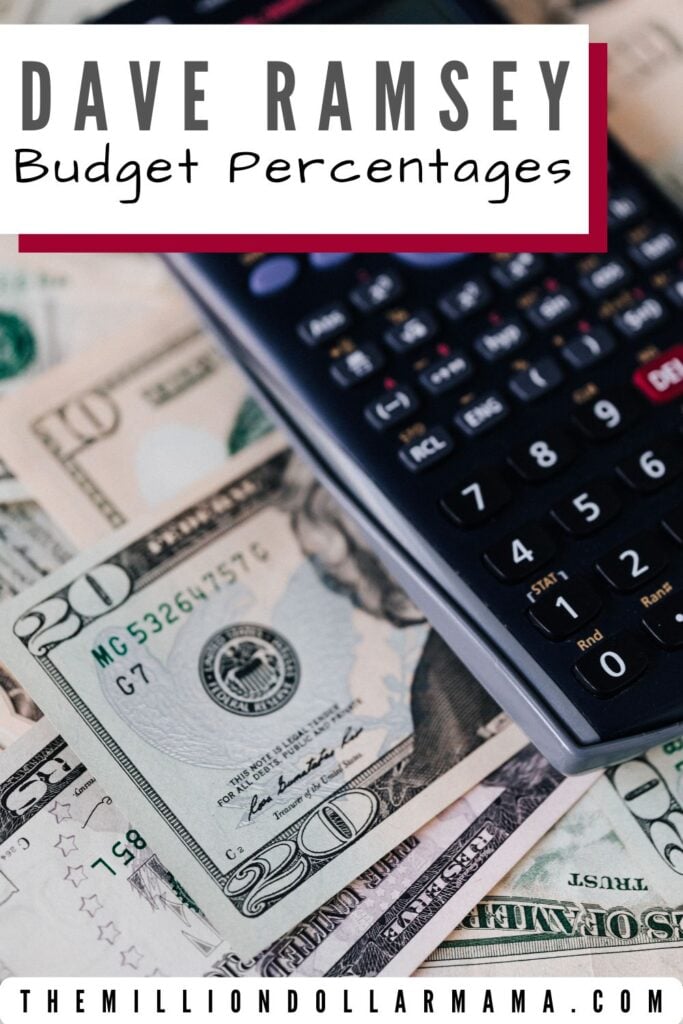If you’re looking to get your finances in order, you may have come across Dave Ramsey’s budget percentages. In addition, Ramsey recommends a few budgeting categories such as food, saving, giving, and spending.

In this post, we’ll take a look at what each of these categories mean and how you can apply them to your own personal budget.
Dave Ramsey Food Budget Percentage
The first category is food. Ramsey suggests that you budget 10-15% of your income for needs like food. This may seem like a lot, but keep in mind that food includes groceries, eating out, and any other related expenses.
To make sure you’re sticking to this percentage, track your spending for a month to see where your money is going. Then, make a budget and see if you can cut back in any areas.
Check out these articles about saving on groceries:
- Grocery Shopping on a Budget
- How to Shop for Groceries on a Budget
- How to Stretch Every Penny Out of Your Budget
Dave Ramsey Saving Percentage
The next category is saving. Ramsey recommends that you budget 10% of your income for savings. This includes savings for retirement, emergencies, and any other long-term goals.
Set up a separate savings account and have a certain amount automatically transferred each month to make sure you’re sticking to this percentage.
Tips for saving:

Dave Ramsey Giving Percentage
The next category is giving. Ramsey recommends that you budget 10% of your income for giving. This can include donations to charity, gifts, and anything else you give to others.
To ensure you keep to this percentage, track your giving for a month and see where your money goes. Then make a budget and evaluate whether you can cut back in any areas.
I disagree on this one. While I do think it is incredibly important to give, I believe you should have all your debt (except mortgage) paid off before you start giving. Or at least give a lesser percentage until debt is paid off.
Dave Ramsey Spending Percentage
The last category is spending. Ramsey recommends that you budget 5% of your income for wants. This includes things like travel, entertainment, and anything else you spend money on for fun.
To ensure you’re staying on track, keep a record of your expenditure for a month and see where your money goes. Then make a budget to see whether you can trim back in any categories.

Descriptions of Dave Ramsey Budget Percentages
Now that we’ve gone over the basics of Dave Ramsey’s budget percentages let’s take a more in-depth look at each one.
Giving
Giving is important because it allows you to help others. When you give to charity, you’re making a difference in the world.
When you give gifts, you’re showing your loved ones how much you care. And when you give of your time or talents, you’re enriching the lives of those around you.
**See my comments above about the importance of paying off debt before you start to give.
Saving
Saving is important because it allows you to set aside money for the future. When you save for retirement, you’re ensuring that you’ll have enough money to live on when you retire.
When you save for emergencies, you’re making sure that you can cover unexpected expenses. And when you save for long-term goals, you’re setting yourself up for success.
Related: How to Save Money in Your Daily Life
Food
Food is important because it’s a necessity. You need food to live, and you need to budget for it accordingly. When you’re budgeting for food, you need to take into account groceries, eating out, and any other related expenses.
Utilities
Utilities are important because they’re a necessity. Therefore, you need to budget for them accordingly. When you’re budgeting for utilities, you need to consider electricity, gas, water, and any other related expenses.
Related: Easy Ways to Cut Your Electric Bill in Half
Housing
Housing is important because it’s a necessity. Therefore, you need to budget for it accordingly. When you’re budgeting for housing, you need to take into account rent or mortgage payments, property taxes, and any other related expenses.
Related: 10+ Tips for First Time Home Buyers

Transportation
When you’re budgeting for transportation, you need to take into account car payments, gas, and any other related expenses.
On the subject of transportation is ensuring you are purchasing a vehicle within your means. A vehicle should be no more than 10-15% of your annual income.
For example, if you make $100K/year, your vehicle should cost $15K MAX. Now I know that has been difficult recently with the increased demand and decreased supply of used autos, but do the best you can.
What I’m basically saying is don’t go out and buy a $50K truck on a $100K salary.
And if you can get away without owning a car, even better!
Health
Health care is another necessity. Therefore, you need to budget for it accordingly. When you’re budgeting for health care, you need to take into account insurance premiums, co-pays, and any other related expenses.
If your job offers health insurance, this is the easiest, cheapest way to stay covered.
Insurance
When you’re budgeting for insurance, you need to take into account life insurance, health insurance, and any other related expenses.
While insurance doesn’t bring you a ton of pleasure, it can help you avoid a lot of grief if something terrible does happen. Just note that insurance should never be used as an investment vehicle.
If anyone tries to sell you insurance as an investment, run away!
You’ll notice the above expenses are all necessities. These are areas where you *should absolutely ensure you are including in your budget.

Recreation
Recreation is important because it allows you to relax and enjoy your free time. When you’re budgeting for recreation, you need to take into account things like entertainment, hobbies, and any other related expenses.
Personal spending
Personal spending is important because it allows you to take care of yourself. When you’re budgeting for personal spending, you need to take into account things like haircuts, clothing, and any other related expenses.
As a side note, the boyfriends and I started cutting our own hair when COVID hit, and we’re still doing it!
I also buy a majority of my clothes used from consignment stores. I find higher quality items for much lower prices. Try an online consignment shop like Thredup.
Miscellaneous
The miscellaneous category is important because it allows you to account for any expenses that don’t fit into the other categories. When you’re budgeting for miscellaneous expenses, you need to take into account things like gifts, travel, and any other related expenses.
Debt
Debt payments are important because they allow you to get out of debt. When you’re budgeting for debt payments, you need to take into account things like credit card payments, student loan payments, and any other related expenses.
Some tips for getting out of debt:
- Invest While Paying Off Debt
- 5 Tips to Help You Eliminate Debt
- 10 Tips to Become Debt Free as Fast as Possible
- 5 Things to Give Up to Get Out of Debt
How The Dave Ramsey Budget Percentages Can Help With Your Debt Snowball
If you’re like most people, you probably have some debt that you’re trying to pay off. The Dave Ramsey budget percentages can help you do that.
The debt snowball method is a way of paying off debt that Dave Ramsey has popularized. The idea behind the debt snowball is to pay off your debts in order of smallest to largest.
This is effective because it allows you to see progress quickly. As you pay off each debt, you’ll have more money available to put towards the next debt on your list.
This can be a great motivational tool when you’re trying to get out of debt.
The Dave Ramsey budget percentages can help you make the debt snowball method work for you.
Here’s how it works:
First, you need to calculate your after-tax income. This is the money you have left over after you’ve paid all of your taxes and other pre-tax deductions.
Next, you need to calculate your monthly expenses. This includes things like your mortgage payment, car payment, student loan payments, and any other debts you have.
Once you know your after-tax income and your monthly expenses, you can start to allocate your money according to the Dave Ramsey budget percentages.
It allows allows you to identify potential areas you can cut unnecessary expenses.
Related: Financial Budget Makeup and Paycheck Budgeting

Related FAQs
What is the 70/20/10 budget rule?
The 70/20/10 Budget Rule takes 70% of your income and puts it towards monthly bills and miscellaneous spending.
20% of your income goes towards saving and investing, and the last 10% of your income goes towards debt payments or charity.
What is the 50/20/30 budget rule?
The 50/20/30 Budget Rule takes 50% of your income and puts it towards needs.
30% of your income goes towards wants, and the last 20% of your income goes towards savings.
I personally like to create my own rule: the 50/40/10 budget rule. This is where 50% of your income goes to needs, 40% goes to debt payoff OR savings/investing and 10% goes to fun money!
Review of The Recommended Percentages for Budget
To break it down, the Dave Ramsey recommended budget categories include the following percentages:
- Giving: 10%
- Saving: 10%
- Food: 10-15%
- Utilities: 5-10%
- Housing: 25%
- Transportation: 10%
- Health: 5-10%
- Insurance: 10-25%
- Recreation: 5-10%
- Personal Spending: 5-10%
- Miscellaneous: 5-10%
When it comes to budgeting, there is no one-size-fits-all solution. The key is to find a system that works for you and stick with it. The percentages above are simply a guideline to help you get started.
These percentages are meant to provide a general overview of the types of expenses you should consider when creating your budget. For more detailed information on creating a budget, check out Dave Ramsey’s website.
When you’re creating your budget, make sure to take into account your income, your expenses, and your goals. Once you have a handle on those three things, you can start to figure out how to allocate your money best.
Remember, the goal is to create a budget that works for you. Of course, there is no perfect budget, so don’t get discouraged if it takes some trial and error to find a system that works for you.
The important thing is to stay mindful of your spending and make adjustments as needed.
Do you follow Dave Ramsey’s prescribed budget percentages? Why or why not? Comment below!
Hi I’m Ana. I’m all about trying to live the best life you can. This blog is all about working to become physically healthy, mentally healthy and financially free! There lots of DIY tips, personal finance tips and just general tips on how to live the best life.


Leave a Reply